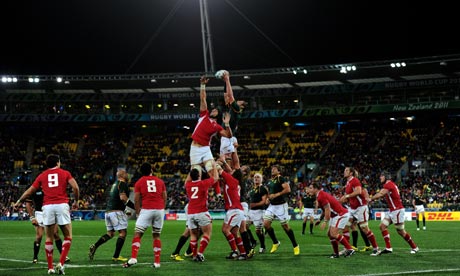
Peter de Villiers was in form at South Africa's media conference on Monday morning, warning anyone who would listen that South Africa would get stronger as rugby in the tournament became less expansive.
The South Africa coach's message was that as teams became concerned at the inconsistency of referees, especially at the breakdown, they would be less prepared to take risks and take refuge in kicking the ball down field. "It used to be that you only had to analyse opponents," he said. "Now you have to do research on referees."
Referees were one of the issues of the opening weekend. Media staff were besieged by telephone calls on Monday morning from journalists, almost all from New Zealand outlets, demanding to know what action would be taken against Wayne Barnes for not referring a James Hook penalty, which Wales thought had gone through the posts, to the television match official.
Barnes has not been forgiven here for the way he controlled New Zealand's quarter-final against France in Cardiff four years ago. Oh No Wayne, You've Done It Again said one headline in a Wellington newspaper.
Barnes and his touch judges ruled that the kick had missed and did not feel the need to go upstairs, which was their right. There was, though, doubt and if he felt the need for Francois Steyn's opening try to be confirmed, why not Hook's kick?
The initial, erroneous message from organisers on Sunday night was that the television match official did not have the authority to rule on kicks, but that was rectified within 12 hours and all officials will be reminded this week that if they are unsure whether a kick is good, the referee should call on the television match official.
The Hook kick was, in one sense, a side-issue. There were deeper concerns about officiating in the opening games. Before the start of the tournament, the International Rugby Board's director of referees, Paddy O'Brien, told referees and coaches there were five key areas where consistency of application would be demanded.
The third involved mauling. "The ball-carrier in a maul," said O'Brien, "must be available to be tackled by the defending team." So when England, trailing by six points, kicked a penalty to touch and then drove the lineout, why was Dylan Hartley allowed to carry the ball behind the rest of his forwards?
There was no way an Argentina defender could get to him within the laws. The referee Bryce Lawrence had penalised England for doing something similar in the first half, so why not when the game was at a crucial stage? England were allowed to go on and set up the base from which Ben Youngs scored the try that gave the 2007 beaten finalists a lead they were not to lose.
What is the point of issuing directives if they are ignored at key moments? And why is it that underdogs tend to be the victims? Upsets were threatened over the weekend, but not one materialised.
Some underdogs blew up but others were blown up. Argentina conceded seven penalties in the final quarter of their game against England and were awarded none. Wales were liberally supplied with penalties in the opening hour of their game against South Africa, but only one in the final 20 minutes of a game that ended when Mike Phillips was scragged as he went to pick up the ball from a ruck and the Springboks helped themselves.
Upsets help make a tournament, but they will remain rare in World Cups until laws and directives are applied equally to all. Argentina defeated France in the 2007 opener not least because the referee Tony Spreadbury did not buckle to pressure and spray the hosts with penalties in the final 10 minutes. And what happened to him for the rest of the tournament?
Credit to South Africa and England for, yet again, having the mental strength to get themselves out of a scrape, but it is time referees were seen to be accountable otherwise draw cards will continue to benefit.
• This is an extract from The Breakdown email, which will be launched every weekday throughout the Rugby World Cup. To subscribe for free click here.







